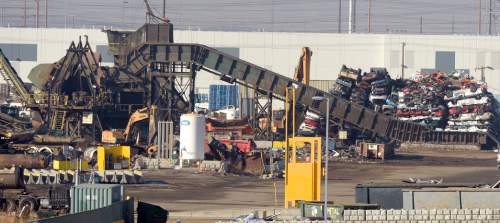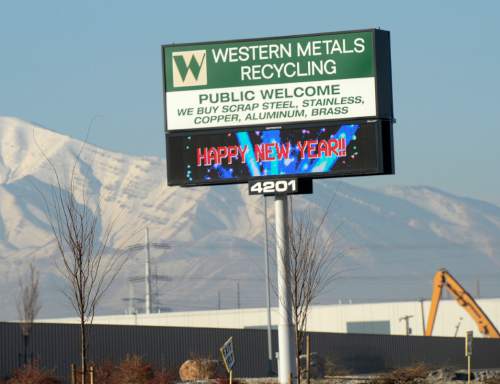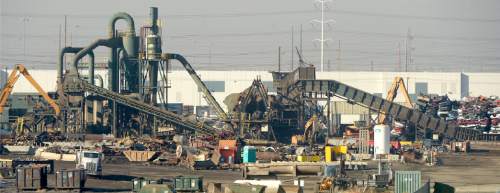This is an archived article that was published on sltrib.com in 2015, and information in the article may be outdated. It is provided only for personal research purposes and may not be reprinted.
Utah's scrap metal processors don't want local health departments telling them what to do.
And they certainly don't want the state requiring them to remove greasy oil filters from the engine blocks of junked cars.
But a bill to give metal recyclers essentially free rein stalled in the Senate Business and Labor Committee on a tie vote Tuesday.
"County health departments are starting to expand into areas they were never into before," said sponsoring Sen. Scott Jenkins, R-Plain City. "It's amazing to me to see how they are starting to grow and the influence they are exerting across the spectrum. This is just one item in that spectrum and it happens over and over."
At one point, Jenkins lapsed into a long explanation of onerous health department requirements for using two spatulas to flip burgers at public events — one for putting the raw meat on the grill, the other to take the cooked patty off.
His SB171 has nothing to do with food handling, but rather stems from a dispute between state and local regulators and Western Metals Recycling over alleged violations involving used motor oil.
The Utah Department of Environmental Quality objects to the Salt Lake City scrapyard's practice of leaving leaking oil filters in place in old cars destined for the shredder. The department fined the company $17,000 for other violations, but the oil filter dispute is unresolved.
Regulators say the filters should be removed and drained while hot. Failure to remove them could contaminate material coming out of the shredder and release oil into the environment, according to filings with an administrative law judge hearing the dispute.
Western Metals, a Nucor subsidiary that feeds its northern Utah steel mill, says it is safer to leave the filters on engine blocks. No other state requires their removal, company executives testified Tuesday.
"Auto recyclers across the country were surprised by Utah's interpretation of the oil filter law," said Western Metals' Jeremy McRoberts. "This interpretation will cause more harm to the environment and more opportunities for spillage."
Utah Division of Solid and Hazardous Waste Director Scott Anderson contends DEQ does not require removal of filters, but that failure to drain them complicates how they are regulated.
"If an oil filter is drained, it can qualify as a scrap metal and is not defined as a solid waste," Anderson said. "The question we have posed to Western Metals is this: 'How are you going to claim the exemption [from solid-waste handling rules] if you don't drain the filter? And how are you going to drain the filter if you don't remove it from the engine block?'"
The far more controversial aspect of Jenkins' bill, however, is its ban on local health boards' regulating "a crusher, dismantler, or scrap-metal processor."
The Salt Lake County Health Department has been negotiating new rules with the businesses for months.
Currently, the department regulates firms that recycle electronics and tires and hopes to oversee scrap-metal businesses, including making regular and random inspections at the 30 or so sites in the county, according to Dorothy Adams, the health department's deputy director.
The agency was blindsided by the bill, Adams said. If Jenkins' bill passes, it would derail the county's efforts.
"This group contends they are being overinspected," Adams said in an interview. But DEQ lacks "the people power to go to every [scrap-metal] industry.
"It's not just used oil," she said. Processing old cars can also release gasoline, antifreeze, battery acid and transmission fluid.
"We need to make sure how and where they extract hazardous waste is done in a manner where public health is protected," Adams said.
But McRoberts alleged the county is orchestrating "a money grab" with "excessive and redundant" requirements and taxes, while the industry already gets adequate oversight from state and federal authorities.
"The Health Department has repeatedly tried to destroy scrap-metal recycling and automotive dismantling by imposing impossible regulations," he said.
Metal recyclers are suspicious of a county proposal last year to reclassify scrap-metal yards as landfills. Such a move would impose millions of dollars in costs to meet tough solid-waste standards and devise closure plans, according to lobbyist Rob Jolley.
"Most of those companies could not afford that," Jolley said. "Most are working in a garage where they strip down vehicles and sell the parts to my client, LKQ," (a Chicago-based metal processor).
But those claims fell flat with the committee, which declined to advance the bill on a 2-2 vote along party lines.
Despite two votes for the measure, GOP committee members worried about tying the hands of counties, which are charged with protecting the health, safety and welfare of their residents.
"This bill doesn't prohibit excessive regulations. It prohibits any regulation by the county," said Sen. Todd Weiler of Woods Cross. "I think it's overreach."
Twitter: @brianmaffly







